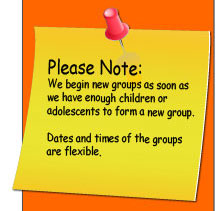January 2009 - Volume 40 |
|
| Helping Children and Adolescents Succeed Socially! | |
| The Social Skills Groups |
|
Promote your child’s well being and they will attract friends into their lives.
Reason is powerless in the expression of Love. Children need a parent, a teacher, just a thoughtful leader who is an authority figure with compassion. At times we may need a plumber or an electrician to fix something in our homes, but the only person who can sincerely assist your child, is YOU. We cannot hire someone to fix our child. You need to see yourself as an instrument of change and your child will change too. Naturally, parents bring children into the world to love and cherish them, at least I hope so. Adults who work with children and young people naturally work with children and young people to assist them and to lead and teach them in a caring way. It is easier said than done. Children act up and parents and professionals who work with children get tired, run down, and lose their patience. We must remember that children need to know that we always sincerely care about them and they must experience us this way. If you lose your temper and patience, tell them and apologize, and reassure your children that you love and care about them. No parent is born with the natural ability to parent another human being. Like it or not, we are often reflecting our own experiences with our own parents, caretakers as well our siblings with our own children or with the children with whom we work. Some of us may have been raised by a father or mother who often expressed depreciation of us. That was less than ideal. Why would we want to recreate such a feeling in a growing child under our care? We wouldn’t if we were sympathetic and thoughtful about our actions. If it felt terrible to us why would we subject another little being to such depreciation? Yelling may work and it may get the child to comply, but it does not make the child feel good about themselves. It makes them feel bad. Then the same child may go to school and cannot attract friends and nice relationships into their lives because they are coming from a place of feeling bad about themselves. How can one have a nice experience with others when they are feeling so bad about who they are? Everyone longs for loving, intimate connections. Harmonious relationships are good for our health, heart, and soul. Sadly, relationships often do not live up to their tender promise, leaving us let down, angry and confused. Heinz Kohut, (1913-1981) was at the center of the twentieth-century psychoanalytic movement in Chicago. As founder of Self Psychology, he coined the term “self soothing” as one aspect of a healthy self. According to Self Psychology, children learn self-soothing as a natural developmental process. The presence of a stable parent, teacher (caretaker) who is available to the child allows them to feel safe in the world and leads to a sense of dealing with the world. Self-soothing is the natural result of the simple effort to attend to ourselves in a caring and thoughtful way. After such a comforting experience the growing child will then be able to take on such a role and self-sooth themselves. They will be able to care for others in a caring and thoughtful way too. It always starts with our self. This will assist the child into attracting friends and nice experiences into their lives. Being shown the way to attend to our needs and ourselves in a caring gentle way, enables us to find more peace in relation to difficult feelings. Self-soothing is an essential skill, not only for peace of mind and comfort, but in developing fulfilling relationships with others. (Friendships) We all want this for our children.
Some ideas taken from: Self-Soothing: A Foundation for Authentic Love John Amodeo, Ph.D. The ability to self-regulate is the other core strength which is so important so that our children can learn to self regulate their behaviors. It is another important essential part of healthy emotional development. It will be discussed in the next month’s newsletter February 2009. The Social Skills Place, Inc. wishes you a healthy, a happy, and a peaceful new year. Make it a nice New Year! -- Susan Stern, LCSW is the founder of The Social Skills Place, Inc. |
| The Social Skills Place, Inc. :: 310 S. Happ Rd, Suite 201 :: Northfield, Illinois 60093 Office 847 446-7430 :: Cell 847 507-8834 :: www.socialskillsplace.com |
|
| (C) 2006-2021 :: All Rights Reserved :: Unsubscribe from our mailings |
